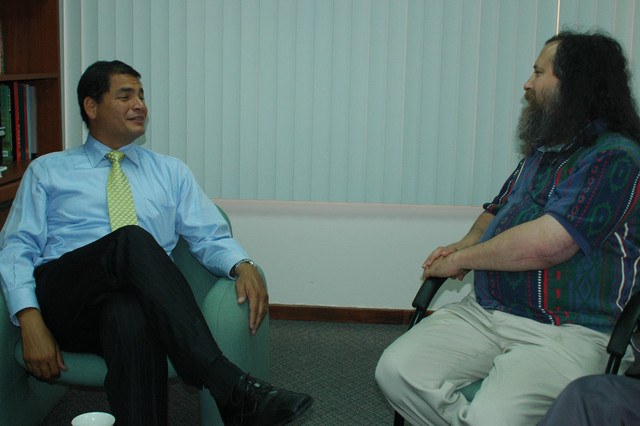Success for free software in Latin America!

Today is one of the happiest days I've had in a long while. Today was the day I received notice that Richard Stallman had a personal talk with Rafael Correa, our newly elected soon-to-be president. And today was the day that the president elect pronounced himself in favor of migrating to free software!
The great news, at a glance
Here's how the story goes (or, the account in Spanish). Richard Stallman met up with Rafael Correa on December the 12th. One fairly known free software advocate, Rafael Bonifaz, was present. He tells us the following:
[...] Stallman spoke [to Correa] for almost 20 minutes nonstop, without Correa saying anything, just listening. After Stallman was finished speaking, there were a few questions and a small conversation ensued, in which both completely agreed and Correa asked his advisors if Ecuador should migrate to free software. Without hesitation, they said yes, and everyone parted with a full-blown smile on their faces, Stallman included [...]
Computers, free software and economy
You'd think this news snippet is small fries. It's not.
Ecuador is a small country, with a population hovering around 13 million inhabitants. About 80% of the population is poor. A good half of the entire population barely has resources to eat.
You may joke and say our people are poor yet jolly, but make no mistake: it's not fun when you're in hunger pains. I myself can't say I've been hungry (though my workstation and stereo are worth more than my 30-year old car), but I do understand the dire situation of 8 out of 10 ecuadorians.
Computers can change that. Information technology has the power to transform a country's economy for the good. Witness Singapore. Witness the U.S. Social problems notwithstanding, one of the largest barriers to happiness in our country is poverty. A country that imports computers and TVs, and exports bananas, cannot expect to create substantial wealth. Thus we cannot have a decent (read: non-hungry, educated, healthy) standard of living for its citizens.
But computers alone cannot change that. A computer without software is a very expensive doorstop. And non-free software does not help. Even if an used computer cost only $250, what's a family going to do when they earn $100 in combined income... run MS-DOS?
Evidently, monopoly rents (licenses) in proprietary software are simply incompatible with our economy. If we want to take advantage of computers, our only options are the GNU and Linux systems and software out there. Otherwise, we'll be attempting to out-compete the competition, using their ground rules. Ha!
Freedom and sovereignity
That Rafael Correa agreed with a free software migration is a huge milestone. Not just because we'll see huge growth in the local IT industry, but because it's a giant step to sovereignity.
Would you trust a doctor that professes to cure you with snake oil? No, right? OK, there is a very small percentage of people who resort to such cures. They don't want to know how the cure works -- they just trust their quack doctors on faith alone. But the biggest slice of the contemporary IT industry does exactly that. Trusting the doctors without being able to figure out how the cure works. Trusting the code without the slightest chance to read the source. Even in the face of major abuses committed by the doctors. And the "doctors" are running amok and profiting from software users' conditions of powerlessness. As a country, we cannot afford to continue trusting these snake oil vendors.
Free software is, simply put, the only choice. And it's the only choice, not because of practical considerations, but because it's the ethical choice.
A projection of the future
Initially, proprietary software companies will wield the flag of "market economies and the freedom to choose". Which we all know to be duckspeak, because freedom in software is not a matter of dollars but principles.
Later on in the game, Rafael Correa, and the rest of the free software movement in Ecuador, will face enormous pressure from foreign organizations. That pressure will come in the form of threats of economic sanctions, withholding of privileges, and it might even escalate to blatant coup d'etat attempts.
Of course, this forecast includes explanations: Correa wasn't exactly the favorite candidate of the current U.S. administration. And remember that free software is anathema to Microsoft and friends. Continued monopolist rhethoric bombs in the vein of "this move debilitates intellectual property" are to be expected during the next years.
As a result, the first attempt to free the local IT industry and government will most probably fail.
I'm certainly hoping for this particular prediction to be completely inaccurate. But it's a probable outcome, given the situation of free software in Peru, our neighbor country. If you haven't been keeping up with the latest news, their migration to free software is roadblocked. Exactly by these kinds of pressure.
But make no mistake: we will succeed. We will leverage every legal and morally just resource to get there. It's not just a battle for software: it's a battle for free culture. Our free culture, which is slowly being eaten away by monopoly interests from unscrupulous people and corporations.
Anyway...
...I'm happy about the announcement. You should be happy too. We may not be the greatest economy in the world, but we're certainly going to live better now. Here's to hoping the ripple effects of a successful free software migration benefits everyone around the globe, with more freedom, better software, more money for better living standards, and happier lives.
¡Viva el Ecuador, carajo! If you get hit by anything newsworthy related to this subject, please let me know using the contact link in this page. I promise I'll publish it immediately.

